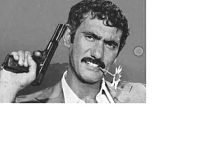ATHENS, Greece - Scores of Syrian Kurdish refugees seeking asylum in European countries remain stranded in refugee camps in Greece.
“Living conditions were horrible in those refugee camps,” said Azad, a Kurdish refugee from Syrian Kurdistan, “They lacked medical care. The refugees faced a lot of mistreatment by the camp police,” he said.
Azad, 21, had illegally reached Greece over a year ago. He was in police custody for two months for using a fake passport to enter the country. Later, he was transferred to a refugee camp near the city of Corinth.
Life in the camp was worse than in Syrian prisons, said Azad, who was allowed to leave the camp about a month ago.
“One day, while I was taking a picture of police mistreatment of a refugee, several policemen surrounded me and started beating me for taking pictures,” he said, adding that he was never provided medical treatment for his injuries.
Azad said that, despite complaints by human rights organizations, camp authorities did not really hold the abusers accountable for their behavior. The police who beat Azad were suspended for two weeks, but later returned to work.
Even though the government decided to release all the Syrian refugees in the camps, Azad was still held there.
“I was the only Syrian refugee remaining in the camp, Azad said. “The police were telling me I would never be allowed to leave.”
Azad said he saw an Afghan refugee named Muhammad Hassan die in the camp due to lack of medical care. “Shortly before his death Muhammad Hassan was finally hospitalized, but it was too late,” Azad said.
Camp authorities had to cut down trees inside the camp in order to prevent refugees from committing suicide, Azad claimed. “Some people had tried to climb the trees and jump off,” he added.
The mistreatment recounted by Azad has been captured in “Greece, a Hell for Refugees,” a documentary film made to raise awareness about the life of the refugees in that country.
Sara Priest, coordinator for the European Union’s refugee organization, says in the film that, “The Greek government would do anything to force the refugees leave its country.”
She also says that obtaining refugee status in Greece means living a terrible life, sleeping on the street and not having access to medical treatment.
Bahzad Nasradin, a refugee in Greece who lives on the streets with his wife and three children, says in the film that, “We survive on the food that my children find in the garbage.”
So far, Nasradin and his family have tried 15 times to get to another European country. But they have been arrested and deported back each time. “It is heartbreaking to see my children scream, but the police are too powerful and I cannot do anything to help my children,” Nasradin says in the film.
Welcome To Roj Bash Kurdistan


Syrian Kurdish Refugees Remain Stranded in Greek ‘Hell’ - Se
4 posts
• Page 1 of 1
Re: Syrian Kurdish Refugees Remain Stranded in Greek ‘Hell’
Most Kurdish refugees in Greece are young and teens who know nothing about life . They sell 2011-20012 car and leave university to go live in an abandoned bus in Greece and live of garbage . Life is about choices and wise ones make the right choice .
-

talsor - Shaswar

- Donator

- Posts: 5003
- Joined: Mon Mar 24, 2008 3:23 pm
- Highscores: 0
- Arcade winning challenges: 0
- Has thanked: 1636 times
- Been thanked: 2465 times
- Nationality: Kurd
Re: Syrian Kurdish Refugees Remain Stranded in Greek ‘Hell’
Man kurds should stop going to europe. They don't realize that EU is declining and going to the toilet. There is no point in moving there any longer. Kurds in KRG should invest in bringing in more kurdish workers and kurdish people into KRG, instead of welcoming 15000 pro-saddam palestinians who fleed, like they did a few years ago and bringing cheap labour from south/south-east asia. That way not only would KRG become more kurdish, but also less kurds would move to humiliating conditions in EU.
-

Feyli_kord - Ashna

- Posts: 425
- Joined: Thu Dec 20, 2007 1:47 pm
- Highscores: 0
- Arcade winning challenges: 0
- Has thanked: 15 times
- Been thanked: 87 times
Re: Syrian Kurdish Refugees Remain Stranded in Greek ‘Hell’
Feyli_kord wrote:Man kurds should stop going to europe. They don't realize that EU is declining and going to the toilet. There is no point in moving there any longer. Kurds in KRG should invest in bringing in more kurdish workers and kurdish people into KRG, instead of welcoming 15000 pro-saddam palestinians who fleed, like they did a few years ago and bringing cheap labour from south/south-east asia. That way not only would KRG become more kurdish, but also less kurds would move to humiliating conditions in EU.
I do not know what else KRG can do
1-Free universities
2-Cheap cheap private universities
3-free health care
4-Free food
5-free land and grants to built a house
6-If i'm not mistake they even have grants to help the youth to get married
7-cheap Gas
8-security
9-booming economy and plenty of jobs
The only thing missing is Free sex
-

talsor - Shaswar

- Donator

- Posts: 5003
- Joined: Mon Mar 24, 2008 3:23 pm
- Highscores: 0
- Arcade winning challenges: 0
- Has thanked: 1636 times
- Been thanked: 2465 times
- Nationality: Kurd
4 posts
• Page 1 of 1
Return to Kurdistan Today News (Only News)
Who is online
Registered users: Bing [Bot], Google [Bot]

















